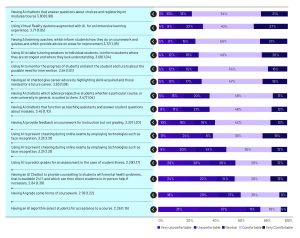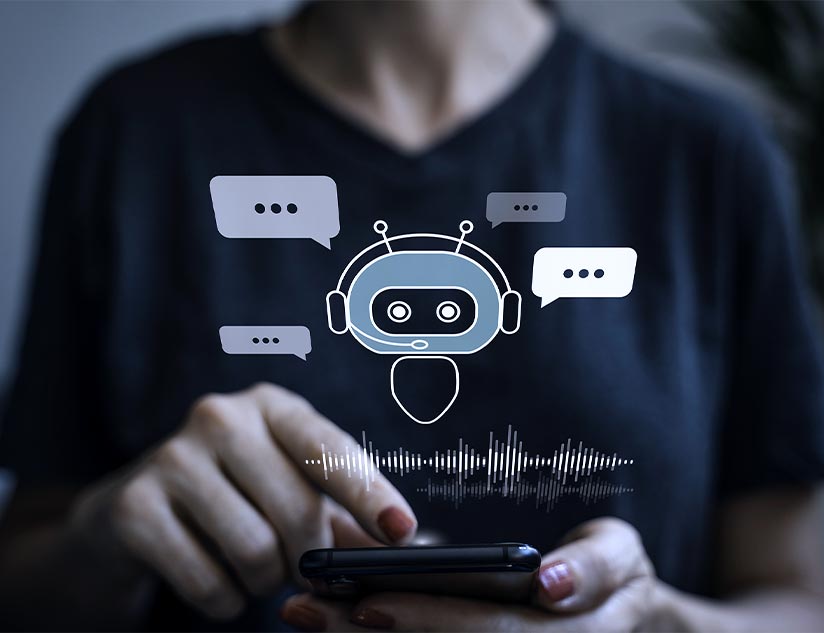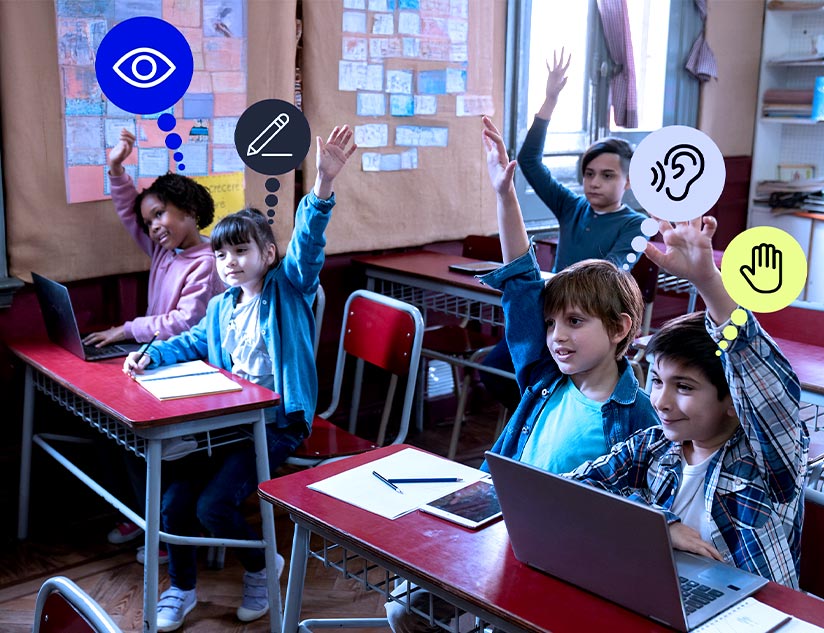The global intelligent virtual assistant (IVA) market size is projected to grow at a whopping CAGR of 32.56% between 2023 and 2028, reaching $41.6 billion by the end of the forecast period. Education is among the top 5 industries driving the growth and adoption of intelligent assistants. AI-powered learning assistants simplify the lives of teachers and students, making education faster, easier, and more effective. Discover the massive potential of smart assistants edtech can tap into in 2024 with this read.
How AI-Powered Learning Assistants Help Teachers
Smart learning assistants offer multiple benefits to educators.
Reduced Workload and Improved Productivity
Learning assistants respond to learners’ queries and suggest additional resources to improve understanding in the absence of educators. They guide students in navigating the online learning platform, reducing the workload for teachers. Additionally, smart lesson creation tools automate content creation, recommend reuse, suggest enhancements to ensure compliance, and improve understandability to boost teachers’ productivity. Modern super teaching assistants can also supplement teaching instruction in real-time, dynamically adapting to individual teaching styles.
Enhanced Student-Teacher Interactions
Since IVAs resolve simple queries, student-teacher interactions focus more on knowledge assimilation and skill acquisition. AI-powered communication tools help participants with different language backgrounds connect and interact seamlessly through natural language processing-based automated translation facilities.
Real-Time Insights for Better Instructional Decisions
In remote learning settings, AI assistants carry out initial interactions with learners and assess their data. These tools offer real-time insights to educators, guiding them on the specific learning needs of the student, their knowledge level, subject proficiency, and learning gaps, if any. This facilitates informed instructional decisions and the adoption of flexible teaching methodologies to improve learner experiences.
Time-Saving Automated Grading and Feedback
One of the most significant benefits of incorporating AI-powered assessment assistants is that educators need not check every single paper or answer individually, especially objective and short answers, which smart tools can easily grade. Additionally, through students’ evaluation reports, AI assistants can offer real-time feedback on their strengths and weaknesses, and recommend reinforcement resources. Teachers can oversee feedback and refine it to align with the curriculum and individual needs. Further, automated record-keeping helps gauge learners’ progress through analytics-based reports without the need for significant manual effort.
How AI-Powered Learning Assistants Help Learners
Students are at the center of all developments in learning methods and platforms. AI adoption offers diverse benefits in this regard.
Personalized Learning Platforms
Intelligent learning assistants can quickly assess student performance, gauge their strengths and weaknesses, and create dynamic, personalized learning paths with tailored resources and activities. They foster a targeted approach to achieving learning outcomes through learning modes preferred by the student. This allows teachers to recognize and address the unique challenges diverse learners face.
Intelligent Recommendations
AI-powered learning assistants suggest supplementary materials and activities according to individual needs. For instance, slow learners may be advised to revisit previously learned concepts. In contrast, quick learners may be recommended further reading to enhance their understanding and build greater proficiency through advanced practice exercises.
Adaptive Learning Strategies
Learner attention has significantly declined in recent times. This makes keeping learners engaged via traditional techniques challenging. Smart assistants observe student activities to discover when they are losing interest and adapt instruction methodology to keep them engaged. Gamification, interactive learning exercises, discussion forums, and conversational flipped classroom-like practices are applied to make the learning experience more immersive and allow students to actively participate in their education.
Instant Feedback
Instant feedback not only eases the lives of teachers but also allows students to discover their weaknesses and promptly bridge learning gaps. This enhances overall student performance and learning outcome achievement.
The Future of AI in Education
AI has immense promise for revolutionizing the education industry in numerous ways:
- Generative AI will prove to be a game-changer for assessments. AI assistants will gain proficiency in evaluating descriptive and long answers.
- AI assistants will be able to verify student documents without manual intervention.
- AI assistants will make remote proctoring possible for online education programs, helping traditional learning penetrate further into regions that lack access to quality education.
- It will foster a culture of smart and productive student-teacher relationships with the combined goal of achieving learning outcomes effectively.
AI as a Trusted Ally
Artificial intelligence is set to establish itself as a trustworthy companion for educators and learners. Advances in super AI and improved accessibility of distance and remote learning opportunities will augment education to deliver faster, more inclusive, and more engaging learning experiences.
The top benefits that are likely to be observed include:
- Personalization without alienation.
- Redefinition of the teacher’s role and responsibilities
- Socio-emotional and collaborative skill development.
A UK-based study on general attitudes toward AI revealed that educators, parents, and students are ready and waiting to experience how AI can transform education.
Source: https://ars.els-cdn.com/content/image/1-s2.0-S2666920X23000292-gr1.jpg
The market is ripe and ready for the AI revolution in education. To remain relevant and gain an edge over the competition, EdTech organizations must include AI in their 2024 strategy. Bolstering the learning platform’s capabilities with AI-powered smart learning assistants is key to ensuring greater adoption and enhanced teaching-learning experiences. Contact MagicBox to learn all about leveraging AI to catalyze digital educational publishing and elevate online learning platform experiences.














